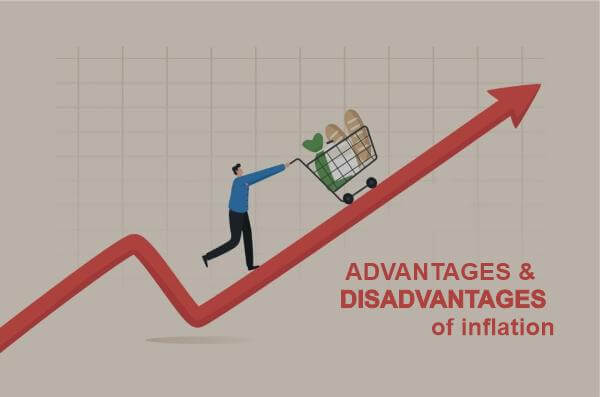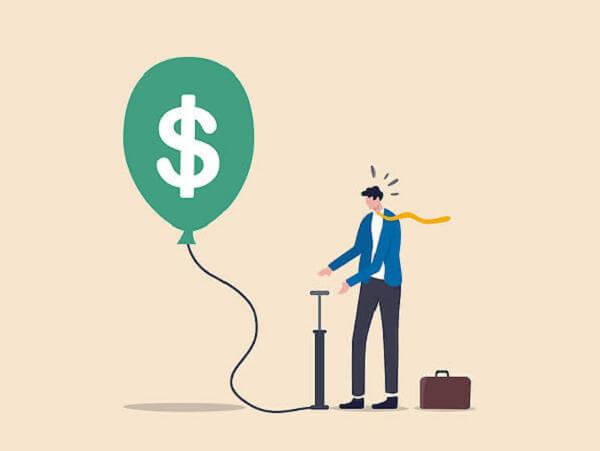Advantages and Disadvantages Of InflationThe increase in prices over time concerning the decline of purchasing power is termed Inflation. In such a scenario, the purchasing power of the individual declines. This implies that the average price of goods and services has increased. Now the individual can collectively buy less quantity of goods and services at the same price. 
Deflation is the contrary state of the economy which implies a decline in prices and an increase in the purchasing power of the individuals. Here, individuals can purchase more goods and services than earlier. A consistent and manageable inflation rate for any healthy economy is considered more beneficial than deflation. Deflation implies that there is a decline in the demand for the products. However, inflation indicates more or greater demand than the goods or services supplied. Hence, inflation is considered a better opportunity for growth for any healthy, is growing, and expanding economy. Inflation is a greater opportunity for growth as it provides room to expand supply. However, deflation indicates that the supply must be reduced to match the current demand levels. The major reason for inflation is the bulk printing of notes. This increases the amount of cash in the economy. Inflation causes decreased purchasing power for individuals. Consumer And Wholesale Price IndexConsumer and wholesale price indexes are among the essential indicators for inflation. These indicators help the analysts to track changes in the prices of the goods. These indicators help to execute corrective measures to control situations of inflation and deflation. Consumer Price IndexThe consumer price index helps to understand the changes in the prices that consumers pay to procure services. It is an essential tool that helps to understand the patterns of change in prices and situations of inflation and deflation. Businesses usually use consumer price index lists, analysts, and even consumers to understand the pattern of price changes and demand and supply scenarios. It also helps the government to take necessary steps to manage situations of deflation and inflation and use the data for corrective measures. Wholesale Price IndexThe wholesale price index calculates the change in prices of the goods before they are sold at retail outlets. This index helps to understand manufacturers' price changes, a major indicator of inflation and deflation. Since these are analyzed before they reach the final consumers, it helps to understand scenarios of inflation and deflation and take corrective measures. This index helps analysts and economists suggest corrective measures in cases of inflation or deflation. The index controls such cases more efficiently as the research is supported by data ted before the final consumers procure the goods. Causes Of InflationInflation doesn't arise due to a single reason. It arises due to multiple reasons. The economy suffers for multiple reasons, creating small price changes in our daily lives. However, these, when combined, these reasons an overall greater case of inflation. Demand-PullWhen the productive units are unable to meet their production capacity, but the demand for these goods or services increases, it increases the mismatch between the demand and the supply. Here the demand to procure or utilize the goods or services is greater than the actual availability of the goods and services in the economy. This allows the prices to increase wither-concerning creases in demand. It pulls the demand to a higher level. Here a gap is created between supply and demand and increasing. Cost- Push
This situation implies an increase in the prices of the production process because the input price also increases. Here the prices of the raw materials utilized have increased due to rising prices. Due to the negative impact on the supply of commodities, prices increase, further increasing consumer prices. Built-in InflationWhen the price of the products rises, the income of the individuals also rises so that the living standards can be maintained. Here the prices of goods and services increase, and the income also rises to keep up with the standard of living. 
Advantages of InflationInflation is a major challenge to the economy as it creates a major hurdle in growth. However, if managed appropriately, inflation is an opportunity for economic growth. Inflation provides the economy with an opportunity to increase production and expand. This gives the producers scope to expand their supply and meet the excess demand. Inflation is not only a situation of excess demand over supply. It is also an opportunity to increase production scale to meet the excess demand. Economic growth A moderate rate of inflation indicates that the economy is expanding and growing. It indicates that the economy is targeting to reduce involuntary unemployment. Reducing unemployment can be successful if a moderate inflation rate is maintained. This shows that the individuals are ready to procure more goods and services and are willing to spend more to obtain them. If inflation is maintained at a moderate rate, it can help the economy grow. It would provide an opportunity for the industrialists to produce more goods to meet the excess demand in the economy. Hence, inflation is a better state for any economy as it can be controlled if the entrepreneurs can support the excess supply with a sufficient increase in demand. Inflation Is Better Than Recession A consistent situation of deflation in the economy can cause a recession. The recession is said to be one of the worst possible economic scenarios. It pulls the growth, GDP, and per capita expenditure down and decreases the economy's overall growth. Since people are reducing their demand for goods and services, the excess supply is also supposed to be reduced. This reduces the income level of businesses and entrepreneurs, which further causes a reduction in the employees' income or even forced unemployment. Hence, inflation is better than deflation as it provides an opportunity to expand the supply. However, the supply has to be reduced in deflation, which further harms the income cycle. This slows the growth rate of the economy. When deflation continues for an extended period in the economy, it gives rise to a recession economy. Adjustment of Wages Inflation allows employees and workers to avail an increase in their incomes. Since inflation is shrinking the purchasing power of individuals, it also allows them to increase their incomes to match up with the rate of inflation. In inflation, excess demand has to be managed by increasing the supply. To increase the supply, it is essential to increase the employment rate. This increases the income of productive workers and employees. This helps them match their incomes with the inflation rate, so they don't lose their purchasing power. Hence, inflation allows individuals to adjust their wages per the inflation rate. This increases the income of efficient and productive employees and workers. Adjustment of Prices If the inflation rate is moderate, adjust the prices of products in the economy. When the inflation rate is moderate, it is possible to increase the prices of the Golightly. This doesn't drastically impact the individuals' purchasing power and allows the entrepreneurs to increase their profits. Since the rate of increase of prices is moderate, the product comes under the purchasing capacity of the individuals. However, the slight increase in prices allows the entrepreneurs to utilize economies of scale to their best and secure greater profits. Hence, inflation allows minor price adjustments to secure profits and manage increased production costs. Disadvantages of InflationInflation is a common stage in every economy. Its occurrence is normal. However, if it is not managed appropriately, it can create huge monetary pressure on individuals, companies, and the government. Hence, it is essential to manage inflation to be used as an opportunity for growth. Unstable inflation trends can even lead to a recession in the economy as it impacts the ability to generate profits in the long run. The unstable economy doesn't have a positive risk appetite. This would further reduce capital formation in the economy. Inflation is a wonderful opportunity for economic growth. However, it also has multiple disadvantages, which are inevitable for the economy. These disadvantages impact the middle and lower section of the economy the worst. Reduces Purchasing Power Over time, a higher inflation rate reduces households' purchasing power. The increase in the rate of prices of goods doesn't match the increase in income. This makes individuals lose approximately 2% of their purchasing power. Inflation impacts the middle and lower section of the population the worst. Since the middle and lower section of the population has limited resources to survive, any negative impact on their purchasing power creates a major negative impact and questions their survival. Hence, inflation drastically impacts the purchasing power of individuals and questions the survival of individuals in an economy. Creates A Greater Burden on The Poor Inflation is a great burden for almost everyone in the economy. The loss of purchasing power impacts the middle class and poor population the most. Since the poor section of the population has limited resources, this loss of purchasing power impacts them the worst. The poor section of the population has a limited to survive, and a sudden increase in prices further reduces their purchasing power. With limited means, they can only afford limited commodities, and inflation limits them even more. Hence, inflation reduces the limited purchasing power of people who belong to the poor section of the economy. Higher Interest Rates In scenarios of crisis, an individual often turns to banks and financial institutions for financial assistance. However, in cases of high inflation, the interest rate on these loans increases. This increases the burden of repayment on the people forced to take loans during the high inflation rate period. The monthly repayment creates a huge burden on people. Higher interest rate increases interest repayment, which is a profit for the financial institutions. However, the burden of this interest repayment is a major problem for individuals. Hence, higher interest rate makes it complicated for people to manage loans. Individuals need to understand the whole structure of loan repayment before taking any loan. It is advised to consult a financial advisor before taking a loan with a high-interest rate. The Higher The Rate Of Inflation Worse The Recession If the interest rate is high, there are higher chances for an upcoming recession. A recession hits the economy and shakes it to its roots. A very high inflation rate means that the prices of goods and services are increasing drastically. This drastic increase in prices reduces the purchasing power of individuals. Over time, this reduces the demand for goods and services. During high inflation, households reduce their demand for goods and services, creating excess supply. Hence, the economy's fall becomes inevitable as the decrease in demand is not avoidable. The excess supply is not supported by demand, forcing the entrepreneurs to produce fewer goods. So, the higher the inflation rate, the worse the upcoming recession. ConclusionInflation is a massive problem for the whole economy. Inflation impacts purchasing power and productivity in the longer run. However, if managed properly, a moderate inflation rate is an opportunity for the economy to grow. The middle and poor populations face the worst impact because of the high inflation rate. Entrepreneurs need to manage demand and supply levels so that the economy can utilize the excess demand situation of inflation as an opportunity to increase employment and production. Hence, inflation is an opportunity to expand and grow. However, inflation carries multiple threats, such as loss of purchasing power and higher interest rates. On the other side, it is much better than deflation or stagflation as it holds an opportunity for growth. Inflation is a decent opportunity to grow the economy. However, it holds a greater threat if it is not managed properly. Hence, it is essential to manage financial resources to utilize the best out of inflation as an opportunity and not consider it a challenge for the economy. |
 For Videos Join Our Youtube Channel: Join Now
For Videos Join Our Youtube Channel: Join Now
Feedback
- Send your Feedback to [email protected]
Help Others, Please Share









